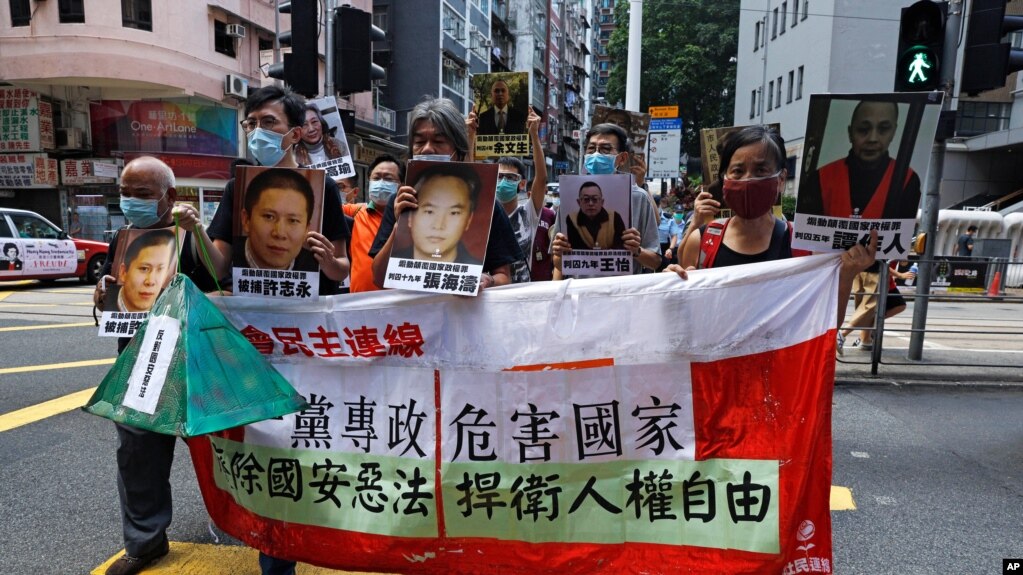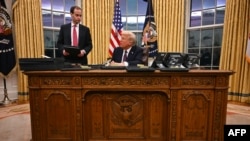ສະຫະລັດຍຸຕິການສົ່ງອອກ ອຸບປະກອນໃນດ້ານປ້ອງກັນປະເທດ ແລະເທັກໂນໂລຈີ ທີ່ໃຊ້ໄດ້ທັງສອງດ້ານ ຄືໃນດ້ານທະຫານ ແລະດ້ານພົນລະເຮືອນ ທີ່ມີຕົ້ນຕໍ ຢູ່ສະຫະລັດ ໄປຍັງຮົງກົງ ດັ່ງດຽວກັນກັບທີ່ໄດ້ກະທຳຕໍ່ຈີນ ໂດຍອ້າງເຫດຜົນທາງດ້ານຄວາມໝັ້ນຄົງແຫ່ງຊາດ.
ການປະກາດດັ່ງກ່າວ ມີຂຶ້ນໃນວັນຈັນວານນີ້ ໃນຂະນະທີ່ຈີນດຳເນີນການເຄື່ອນໄຫວເພື່ອໃຫ້ມີການຮັບຜ່ານກົດໝາຍວ່າດ້ວຍຄວາມໝັ້ນຄົງສະບັບໃໝ່ສຳລັບຮົງກົງ.
ລັດມົນຕີການຕ່າງປະເທດສະຫະລັດ ທ່ານໄມຄ໌ ພອມພຽວ ກ່າວຢູ່ໃນຖະແຫຼງການສະບັບນຶ່ງວ່າ “ສະຫະລັດໄດ້ຖືກບັງຄັບໃຫ້ເອົາມາດຕະການນີ້ເພື່ອປົກປ້ອງຄວາມໝັ້ນຄົງແຫ່ງຊາດຂອງສະຫະລັດ. ພວກເຮົາບໍ່ສາມາດໄຈ້ແຍກ ລະຫວ່າງການສົ່ງອອກສິ່ງຂອງຕ່າງໆ ທີ່ຖືກຄວບຄຸມ ໄປຍັງຮົງກົງ ຫຼືຈີນແຜ່ນດິນໃຫຍ່.”
ຫົວໜ້ານັກການທູດຂອງສະຫະລັດ ກ່າວເພີ້ມວ່າ “ພວກເຮົາບໍ່ສາມາດສ່ຽງທີ່ຈະໃຫ້ສິ່ງຂອງເຫຼົ່ານີ້ ຕົກໄປຢູ່ໃນກຳມື ຂອງກອງທັບປົດປ່ອຍປະຊາຊົນ ຜູ້ຊຶ່ງຈຸດ ປະສົງຕົ້ນຕໍ ກໍແມ່ນໃຫ້ການສະໜັບສະໜຸນອຳນາດຜະເດັດການຂອງພັກຄອມມູ ນິສຈີິນໂດຍທຸກໆວິທີການທີ່ຈຳເປັນ.”
ເປັນທີ່ຄາດກັນວ່າ ສະພາທີ່ເຮັດກົດໝາຍຂອງຈີນ ຈະຮັບຮອງເອົາ ກົດໝາຍທີ່ ມີການປ່ຽນແປງ ໃນດ້ານຄວາມໝັ້ນຄົງແຫ່ງຊາດ ສຳລັບຮົງກົງ ໃນວັນອັງຄານ
ມື້ນີ້ ຊຶ່ງເປັນການເຄື່ອນໄຫວທີ່ພວກຕ້ອງຕິຫຼາຍໆຄົນ ແລະປະຊາຊົນທຳມະດາສາມັນໃນຮົງກົງ ມີຄວາມຢ້ານກົວວ່າ ຈະມອບອຳນາດ ໃຫ້ແກ້ພັກຄອມມູນິິສຈີນ ເສີມຂະຫຍາຍການຄວບຄຸມ ທີ່ເຄັ່ງຄັດຂຶ້ນກວ່າເກົ່າ ແລະເປັນໄພຂົ່ມຂູ່ຕໍ່ຖານະ ພິເສດ ໃນການເປັນຫົວເມືອງທີ່ເສລີທີ່ສຸດໃນຈີນ ຂອງຮົງກົງ.
ສ່ວນຢູ່ທີ່ປັກກິ່ງ ເຈົ້າໜ້າທີ່ຈີນກ່າວວ່າ ການລົງໂທດຂອງສະຫະລັດ “ແມ່ນຈະບໍ່ປະສົບຜົນສຳເລັດ.”
ທ່ານສາວ ລີຈຽນ (Zhao Lijian) ໂຄສົກກະຊວງການຕ່າງປະເທດຈີນກ່າວວ່າ “ບໍ່ວ່າພວກກໍ່ການຈະລາຈົນ ຫຼືພວກແບ່ງແຍກດິນແດນ ຈະເຮັດສຽງດັງປານໃດ ບໍ່ວ່າກຳລັງຕໍ່ຕ້ານຈີນຢູ່ພາຍນອກ ຈະທຳການກົດດັນ ແບບໃດກໍຕາມ ບໍ່ມີໃຜສາ ມາດຍຸຕິການຕັດສິນໃຈແລະການເອົາບາດກ້າວຂອງຈີນ ເພື່ອຊຸກຍູ້ຮ່າງກົດໝາຍວ່າ ດ້ວຍຄວາມໝັ້ນຄົງຢູ່ຮົງກົງໄດ້.”
The United States is ending exports to Hong Kong of defense equipment and dual-use technologies that originate in the U.S. — as it does for China — citing national security purposes.
Monday’s announcement comes as China moves forward with passing a national security law on Hong Kong.
“The United States is forced to take this action to protect U.S. national security. We can no longer distinguish between the export of controlled items to Hong Kong or to mainland China,” U.S. Secretary of State Mike Pompeo said in a statement.
“We cannot risk these items falling into the hands of the People’s Liberation Army, whose primary purpose is to uphold the dictatorship of the CCP by any means necessary,” the chief U.S. diplomat added.
China’s top law-making body is expected to pass a sweeping national security law for Hong Kong on Tuesday, a move that many critics and ordinary Hong Kong residents fear will empower the Chinese Communist Party (CCP) to tighten its control and threaten the unique status of the freest city on Chinese soil.
In Beijing, Chinese officials said the U.S. actions “are doomed to fail.”
“No matter how rioters and separatists clamor, how external anti-China forces mount pressure, no one can stop China's determination and action to promote national security legislation in Hong Kong,” said Zhao Lijian, a spokesman of China's Foreign Ministry.
The U.S. said its action Monday “is a direct consequence” of China’s decision to further undermine Hong Kong’s autonomy that the Beijing government promised to maintain under the Sino-British Joint Declaration, a U.N.-filed international treaty.
On May 27, Pompeo reported to the U.S. Congress that Hong Kong is “no longer autonomous from China” and “Hong Kong does not continue to warrant treatment under United States laws,” given facts on the ground.
Last Friday, the U.S. announced visa restrictions on current and former Chinese Communist Party officials deemed responsible for, or complicit in, undermining Hong Kong’s high degree of autonomy, or undermining human rights and fundamental freedoms in Hong Kong. Family members of such persons may also be subject to these restrictions.
That action came a day after the U.S. Senate passed the Hong Kong Autonomy Act and threatened to impose sanctions on foreign individuals and entities that materially contribute to China's failure to preserve Hong Kong's autonomy.
The United States is not ruling out “additional measures” to reflect the reality on the ground in Hong Kong.




